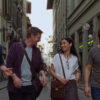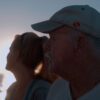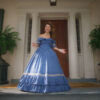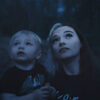“Leonard’s songs felt cinematic to me,” John Lissauer says, describing his first interactions with Leonard Cohen upon meeting him in a recording studio in Montreal when he was just 22 in “Hallelujah: Leonard Cohen, A Journey, A Song.” The two would come to collaborate for the 1974 album “New Skin for the Old Ceremony” on which the producer suggested after Cohen proposed that they co-write it that it would be better for the poet-turned-musician to simply bring the verses to him and they could figure out the instrumentation later, and while they got the record in the can, plans for another had been made, but as Lissauer recalls, Cohen vanished off into Egypt and he wouldn’t hear from him for the next eight years.
This elusiveness is likely far from the only reason why Cohen has eluded a definitive career retrospective for as well documented as his career has been when most artists’ lives don’t lend themselves to a linear narrative, but it makes Daniel Geller and Dayna Goldfine’s decision to build a film around the singer/songwriter’s arguably most definitive work a stroke of genius. Given how many different parts of Cohen’s life have been covered in other worthwhile films, whether it was his formative years (“Leonard and Marianne: Words of Love”), his time spent in a Zen monastery during the ‘90s (“Leonard Cohen on Mt. Baldy”), his late-career resurgence (“I’m Your Man”), tracking the life of the song, which Cohen wrote hundreds of versions of before putting it on his 1984 album “Various Positions” and continued to rework over the years, as it would be by other musicians who covered it and gave it ubiquity it was denied in its initial release, proves to get at a truth of someone constantly in search of transcendence than a more traditionally chronological biopic would be.
Like the song’s gradual march to cultural resonance, “Hallelujah” quietly builds into a rousing epic, unassuming at first as the film draws on audio interviews Rolling Stone writer Larry “Ratso” Sloman had conducted with Cohen over the years and spends time with a diverse yet tight assortment of those who knew him well, from his songwriting partner and backup singer Sharon Robinson to his rabbi Dr. Mordicai Finley, reflecting on the person he had to become before courting the profound with “Hallelujah.” As Sloman reminds, Cohen didn’t even begin writing music until he was 30, and the deliberate process that he would use to write songs itself needed to be refined before combining his interest in exploring his relationship to God and his relationship to the opposite sex.
If one is worried about hearing “Hallelujah” wall to wall, Geller and Goldfine show tasteful restraint, but that is far from the most impressive feat the two pull off in editing the film, surely having a solid road map in consulting producer Alan Light’s book “The Holy or the Broken,” yet locating the music in the history they cover as they bring out the sparks in the personal or professional circumstances that may seem unconnected until seen in parallel. One of the most moving segments of “Hallelujah” doesn’t even have to do with Cohen, but Jeff Buckley, who didn’t yet have the confidence to follow in the footsteps of his late father Tim Buckley as a singer/songwriter when the organizers of a tribute for him suggested he take a crack at the song, a rendition that primed him for a breakthrough and his untimely death propelling it towards popularity it never had before, and after the film keeps its circle of interviews to a minimum, the explosion of having various artists from Brandi Carlile to Glen Hansard speak to the song’s power has an impact as considerable as what the film is celebrating. Not only does it appear to confirm the instincts that led Cohen to write “Hallelujah” in the first place, but also Lissauer’s suspicions it was the stuff of great cinema.
“Hallelujah: Leonard Cohen, A Journey, A Song” will screen at the Venice Film Festival on September 2nd at 2 pm at the Sala Grande and September 3rd at 8:30 am at the Astra 1, 8:45 am at the Astra 2, 1:45 pm at the Sala Pasinetti, 2 pm at the Astra 1, 2:15 pm at the Astra 2 and 4:30 pm at the Sala Pasinetti and the Sala Perla 2.




